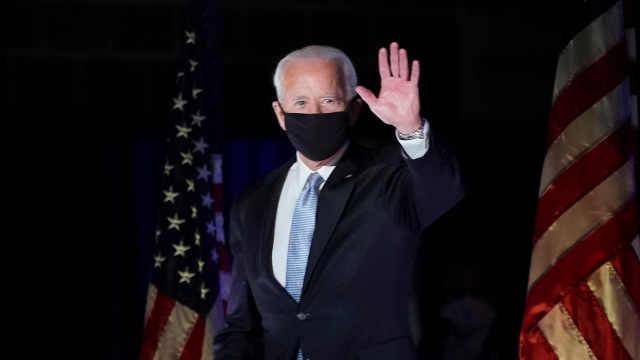Tentang KamiPedoman Media SiberKetentuan & Kebijakan PrivasiPanduan KomunitasPeringkat PenulisCara Menulis di kumparanInformasi Kerja SamaBantuanIklanKarir
2025 © PT Dynamo Media Network
Version 1.102.2
Konten dari Pengguna
How Biden Can Advance Indonesia-US Relations
2 Desember 2020 13:40 WIB
Tulisan dari Ted Gover, Ph.D tidak mewakili pandangan dari redaksi kumparan

ADVERTISEMENT
One of the chief foreign policy priorities of President-elect Biden will be to recalibrate relations with China. Part of this must involve creating a counterbalance in the region by deepening ties with Southeast Asia--Indonesia in particular.
ADVERTISEMENT
This imperative presents obstacles and opportunities for both countries.
For decades, U.S.-Indonesia ties have seldom realized their full promise and different administrations have struggled navigating Indonesia’s non-aligned, independent foreign policy.
Due to mistrust of American motives, domestic political sensitivities and for fear of upsetting Beijing (it’s largest trading partner), Jakarta has backed away from entering into treaty alliances with Washington and other foreign powers, opting for working relations to take place on understated, even quiet terms.
In the eyes of some, Jakarta’s admirable non-aligned approach and preference for working within the auspices of ASEAN (the Association of Southeast Asian Nations) can at times work against its own national security interests. This dynamic is partly reflected in Indonesia’s stated neutrality on South China Sea maritime disagreements - - arguing that it is a non-claimant party - - despite having its own vexing maritime issues with China.
ADVERTISEMENT
Incursions of Chinese fishing and coast guard vessels into the resource and seafood-rich waters of the Natuna Islands - - which fall within Indonesia's exclusive economic zone (EEZ) - - are common. Although the Natuna Islands are sovereign Indonesian territory, China has referred to the Natuna Islands’ waters as "traditional Chinese fishing grounds" and many analysts believe that the Chinese are aiming to include the islands within their expansive nine-dash line South China Sea claims.
Taking these challenges into consideration, the Biden administration must find ways to enhance working relations with Jakarta while allowing room for its preference of operating within ASEAN. Striking this important balance will be necessary for advocating for a free and open Indo-Pacific, pushing back against Chinese coercion and building a future of shared prosperity between the American and Indonesian peoples.
ADVERTISEMENT
There are a number of politically palatable areas in which both nations can collaborate to meet the challenges of the coming decades, among them, Beijing’s increasingly assertive behavior in the region.
For starters, the U.S. must increase its economic outreach to Indonesia. The yearly bilateral trade - - an underwhelming US$30 billion - - fails to live up to its potential for both countries.
Recent visits to Jakarta by the heads of the new U.S. International Development Finance Corporation (DFC) and the U.S. Export-Import Bank (EXIM) for discussions on investment and trade, accompanied by outgoing Secretary of State Mike Pompeo’s October meetings promoting U.S. involvement in the digital and energy infrastructure sectors are steps in the right direction.
ADVERTISEMENT
Additional American investment in Indonesia--private and public-- is overdue. While costly red tape and problematic bureaucracy set back U.S. business operations and must be addressed, Indonesia’s growing demographics as the world’s largest Muslim country and fourth largest populated nation present a variety of long-term opportunities for strategic commercial engagement.
One area in need of American investment is the relocation of Indonesia’s national capital from Jakarta to East Kalimantan Province in Borneo. Set to begin in 2024, the move is estimated to cost over US$33 billion and is likely to take well over a decade to complete. This endeavor will require support, financing and expertise that the U.S. is positioned to help provide.
ADVERTISEMENT
The new Biden administration must also ramp up diplomatic overtures to Jakarta directly and via ASEAN as Washington has much catching up to do. To date, President Joko Widodo has met with Xi Jinping a total of eight times since taking office while he has only met President Trump once at the 2017 G20 summit in Germany.
Furthermore, the U.S. also appears to be losing influence in Southeast Asia. According to the ISEAS-Yusof Ishak Institute’s State of Southeast Asia: 2020 Survey Report, 47% of Southeast Asian “strategic elites” have little or no confidence in the U.S. as a strategic partner or provider of regional security and 77% believe that American engagement of ASEAN has declined under the Trump administration. The same survey found that Beijing is viewed by wide margins as the most influential economic and political-strategic power in Southeast Asia
ADVERTISEMENT
To make headway against these trends, President-elect Biden, incoming Secretary of State Tony Blinken and other key administration officials need to start attending the yearly ASEAN summit in person as well as appoint a U.S. Ambassador to ASEAN. Additionally, both countries’ presidents would be well advised to begin holding separate annual meetings to discuss opportunities for collaboration, strengthening democratic governance and the rule of law as well as other issues of common concern.
Mr. Biden’s stated goal of assembling a conference of democracies will be a good chance to start engaging President Widodo and reinvigorating U.S.-Indonesian relations. It can also help make up for lost ground after decades of Washington ceding to Beijing opportunities for addressing Indonesia’s considerable needs with infrastructure, economic development, public health and the training of Indonesian government officials by the Chinese Communist Party on everything from intergovernmental relations, party building and member recruitment.
ADVERTISEMENT
People-to-people diplomacy can help forge closer U.S.-Indonesia relations, and an effective card the Biden administration can play is supporting measures for hosting more Indonesian students in the U.S. According to the State Department’s 2020 Open Doors Report, in 2019 there were 8,300 Indonesians studying in the U.S., a paltry amount when compared to 372,532 from China and 193,124 from India, respectively. Washington should increase funding for Indonesian student exchanges and university partnerships, Fulbright scholarships and defraying tuition and cost of living expenses which are often prohibitive for Indonesians aspiring to study at American institutions. Emphasis should also be placed on getting more Americans to study in Indonesia on a yearly basis.
ADVERTISEMENT
It is also time for Washington to build on its security relations with Jakarta. While each year the U.S. and Indonesian militaries conduct over 150 visits, activities and exchanges, there are additional key steps that can be taken to build trust and further develop capacities for conducting operations together. Such measures should include more training for Indonesia’s navy, coast guard and air force; increased multilateral exercises and arms sales to enhance air and sea capabilities; joint anti-terror training; additional military officer exchanges; broadening defense intelligence sharing; and a commitment to hold yearly visits between the U.S. Secretary of Defense and the Indonesian Defense Minister.
Other constructive steps should include the political sphere. American and Indonesian lawmakers and their staff need to meet on an annual basis in order to facilitate understanding of one another’s domestic partisan issues and international concerns. Efforts should be made by both countries to strengthen regional forums such as ASEAN, APEC (Asia-Pacific Economic Cooperation) and the East Asian Summit (EAS) as well as to identify initiatives for working together at the United Nations.
ADVERTISEMENT
While committing to sustained engagement at the highest levels, the new Biden administration can effectively work with Jakarta to strengthen ties and meet mutual goals amid Southeast Asia’s rapidly evolving economic and strategic landscape.

